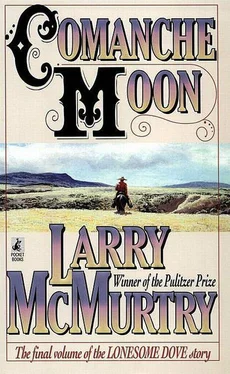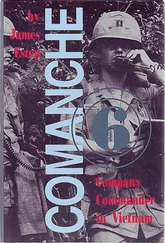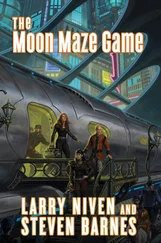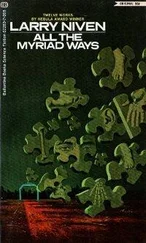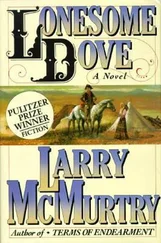He wanted, again, what he had had with Inez Scull. He didn't understand why she had cut his hair and thrown him out. Her coldness upset him so that he stole a bottle of whiskey from a shed behind the saloon and drank the whole bottle down.
The whiskey burned at first, and then numbed him a little, but it didn't cool the fever he felt at the memory of his hot tusslings with Inez Scull. Only a woman could cool that fever, and the handiest woman happened to be Woodrow Call's whore.
She had very white skin, the whore--when he slapped her, her cheek became immediately red. But the slap didn't set things off, as it had when Madame Scull slapped him. Maggie, Call's whore, didn't utter a sound. She didn't slap him back, or grab him, or do anything wild or raw. She just put the money away, took off her dress, and lay back on the bed, waiting. She wouldn't even so much as look at him, although, in an effort to make her a little more lively, he pulled her hair. But neither the slap nor the hair pulling worked at all.
Except for flexing herself a little when he crawled on top of her, the whore didn't move a muscle, or speak or cry out or yell or bite or even sigh. She didn't scream and kick and jerk, as Madame Scull did every time they were together.
As soon as the young ranger finished--it took considerably longer than she had hoped--Maggie got off the bed and went behind a little screen, to clean herself. She meant to stay behind the screen, hiding, until Jake Spoon left. She knew she would have a bad bruise on her cheek, from the slap. She didn't want to see the young man again, if she could help it.
Again, though, Maggie was not lucky. While she was cleaning herself she heard Jake retching and went out to find him on his hands and knees again. At least he was vomiting in a basin; he had not ruined the new carpet she had saved up to buy.
Jake Spoon heaved and heaved.
Maggie saw how young he was and took a little pity.
When he finished being sick she cleaned him up a little and helped him out the door.
"Now boys, look there!" Inish Scull said, pointing westward at a small red butte.
"See that? Pretend it's your Alps." "Our what, Captain?" Long Bill inquired. It was breakfast time--Deets had just fried up some tasty bacon, and the breeze, though chilly, could be tolerated, particularly while he was sitting at the campfire holding a tin mug of scalding coffee that in texture was almost as thick as mud. All the rangers were hunched over their cups, letting the steam from the scalding coffee warm their cold faces. The exception was Woodrow Call, already saddled up and ready to ride--though even he had no notion of where they were headed, or why. They had travelled due south for a few days, but then the Captain suddenly bent to the west, toward a long empty space where, so far as any of the rangers knew, there was nothing to see or do.
The low, flat-topped hill was red in the morning sunlight.
"The Alps, Mr. Colemanffwas the Captain repeated. "If you find yourself in Switzerland or France you have to cross them before you can get to Italy and eat the tasty noodle. That was Hannibal's challenge. He had all those elephants, but the Alpine passes were deep in snow. What was he to do?" Captain Scull was drinking brandy, his morning drink and his evening drink, too, when he could have it.
One well-padded brace of saddlebags contained nothing but brandy. A tipple or swallow or two in the morning cleared his head wonderfully, when he was campaigning, and also rarely failed to put him in a pedagogical mood. History, military history in particular, was his passion.
Harvard wanted him to teach it, but he saw no reason to be teaching military history when he could go out in the field and make it, so he packed up the ardent Dolly Johnson, his Birmingham bride, and went to Texas to fight in the Mexican War, where he promptly captured three substantial towns and a number of sad villages. The air of the raw frontier so invigorated him that he gave little thought to going back to Boston, to the library and the ivied hall. Because of his long string of victories in Mexico he was soon offered the command of the disheveled but staunch band of irregulars known as the Texas Rangers.
Inish Scull was convinced, from what he knew of politics, that a great civil conflict was looming in America, but that conflict was yet some years away. When it came, Inish Scull meant to have a generalship--and what better way to capture the attention of the War Department than to whip the Comanche, the Kiowa, the Apache, the Pawnee, or any other tribe that attempted to resist the advance of Anglo-Saxon settlement?
Scull might not have broken the wild tribes yet, but he had harried them vigorously for almost ten years, while, little by little, settlement crept up the rivers and into the fertile valleys. Farms and ranches were established, burned out by the red men, and built again. Small poor townships were formed; wagon roads rutted the prairie; and the government slowly placed its line of forts along the northern and western line of settlement. All the while, Scull and his rangers ranged and ranged, hanging cattle thieves in the south and challenging the fighting Indians to the north.
Still, now and then, with a prickle of brandy in his nostrils, and a cold wind worthy of New England cooling his neck, Scull found that the professor was likely to revive in him, a little.
At moments he missed the learned talk of Cambridge; at times he grew depressed when he considered the gap in knowledge between himself and the poor dull fellows he commanded--they were brave beyond reason, but, alas, untutored. Young Call, it was true, was eager to learn, and Augustus McCrae sometimes mimicked a few lines of Latin picked up in some Tennessee school. But, the truth was, the men were ignorant, which is why, from time to time, with no immediate enemy to confront, he had started giving little impromptu lectures on the great battles of history. It was true that the little butte to the west did not look much like an Alp, but it was the only hill in sight, and would have to serve.
"No, you see, Hannibal and his elephants were on the wrong side of the hills--or at least he wanted his enemies to think so," Scull said, pacing back and forth, his brandy glass in his hand. He hated to drink brandy out of anything but glass. On every patrol he carefully wrapped and packed six brandy glasses, but, despite his caution, he would usually be reduced to taking his brandy out of a tin cup before the scout was finished.
"What was he doing with elephants if he was out there in the snows?" Augustus asked. He hated it when the Captain got in one of his lecturing moods--though, since as far as he could tell they were just wandering aimlessly now, it probably didn't much matter whether they were riding or getting a history lesson. Now there the Captain was, drunk on brandy, pointing at some dull little hill and prattling on about Hannibal and elephants and snow and Alps and Romans.
Gus could not remember ever having heard of Hannibal, and he did not expect to enjoy any lecture he might receive, mainly because one of his socks had wrinkled up inside his boot somehow and left him a painful blister on the bottom of his foot. He wanted to be back in Austin. If he limped into the Forsythe store looking pitiful enough Clara might tend to his blister and permit him a kiss besides. Instead, all he had in the way of comfort was a mug of coffee and a piece of sandy bacon, and even that comfort was ending. Deets had just confided in him that they only had bacon for one more day.
"Why, Hannibal was African," Scull said. "He was a man of Carthage, and not the only great commander to use war elephants, either.
Alexander the Great used them in India and Hannibal took his on over the Alps, snow or no snow, and fell on the Romans when they least expected it. Brilliant fighting, I call it." Call tried to imagine the scene the Captain was describing--the great beasts winding up and up, into the snowy passes--but he had never seen an elephant, just a few pictures of them in books. Though he knew most of the rangers found it boresome when the Captain started in lecturing, he himself enjoyed hearing about the battles Captain Scull described. His reading ability was slowly improving, enough so that he hoped, in time, to read about some of the battles himself.
Читать дальше
